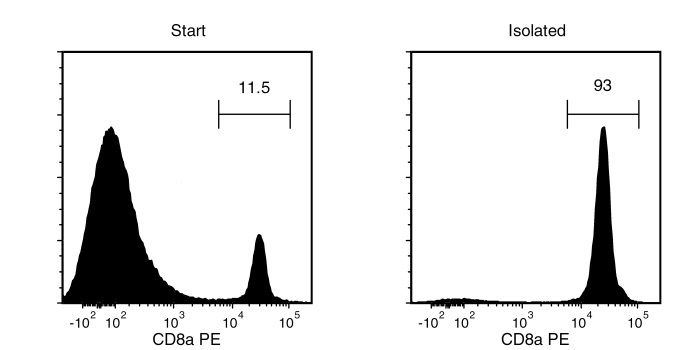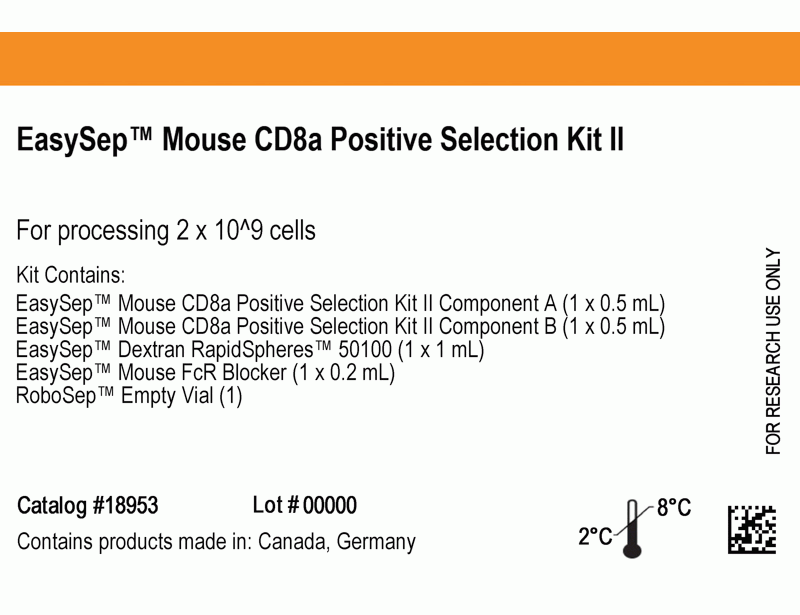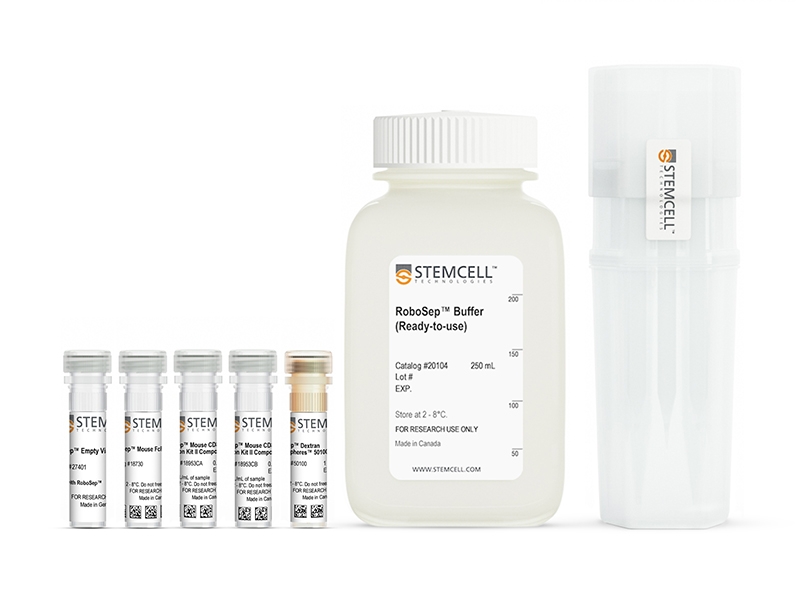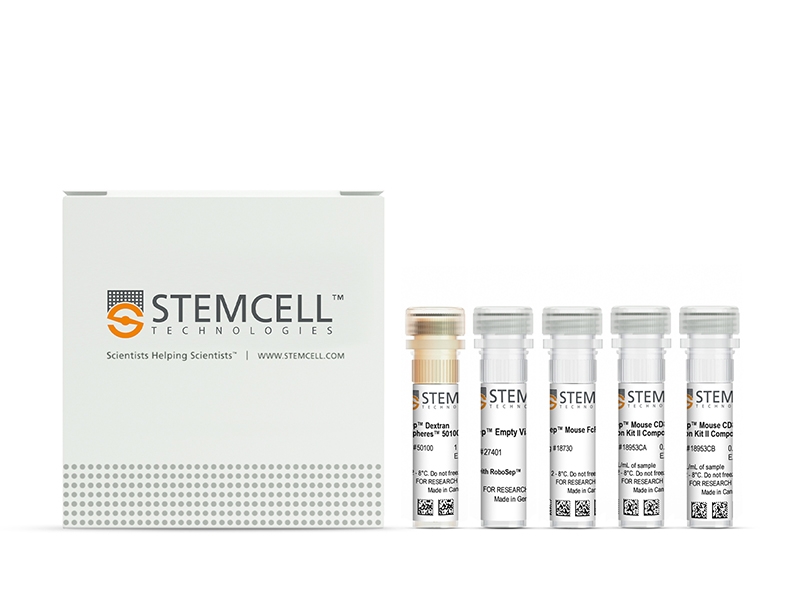概要
The EasySep™ Mouse CD8a Positive Selection Kit II is designed to isolate CD8a+ cells from single-cell suspensions of splenocytes or other tissues by positive selection. Desired cells are targeted with antibody complexes recognizing CD8a and dextran-coated magnetic particles. Labeled cells are separated using an EasySep™ magnet without the use of columns. Cells of interest remain in the tube while unwanted cells are poured off.
This product replaces the EasySep™ Mouse CD8a Positive Selection Kit (Catalog #18753) for even faster cell isolations and does not result in the labeling of isolated cells with PE.
This product replaces the EasySep™ Mouse CD8a Positive Selection Kit (Catalog #18753) for even faster cell isolations and does not result in the labeling of isolated cells with PE.
技术资料
| Document Type | 产品名称 | Catalog # | Lot # | 语言 |
|---|---|---|---|---|
| Product Information Sheet | EasySep™ Mouse CD8a Positive Selection Kit II | 18953 | All | English |
| Product Information Sheet | RoboSep™ Mouse CD8a Positive Selection Kit II | 18953RF | All | English |
| Safety Data Sheet 1 | EasySep™ Mouse CD8a Positive Selection Kit II | 18953 | All | English |
| Safety Data Sheet 2 | EasySep™ Mouse CD8a Positive Selection Kit II | 18953 | All | English |
| Safety Data Sheet 3 | EasySep™ Mouse CD8a Positive Selection Kit II | 18953 | All | English |
| Safety Data Sheet 4 | EasySep™ Mouse CD8a Positive Selection Kit II | 18953 | All | English |
| Safety Data Sheet 1 | RoboSep™ Mouse CD8a Positive Selection Kit II | 18953RF | All | English |
| Safety Data Sheet 2 | RoboSep™ Mouse CD8a Positive Selection Kit II | 18953RF | All | English |
| Safety Data Sheet 3 | RoboSep™ Mouse CD8a Positive Selection Kit II | 18953RF | All | English |
| Safety Data Sheet 4 | RoboSep™ Mouse CD8a Positive Selection Kit II | 18953RF | All | English |
数据及文献
Data

Figure 1. Typical EasySep™ CD8a Positive Selection Profile
Starting with mouse splenocytes, the CD8a cell content of the isolated fraction typically ranges from 88 - 98%.
Publications (2)
Cancer research 2020 oct
RIG-I-like receptor LGP2 is required for tumor control by radiation therapy.
Abstract
Abstract
Dendritic cells (DC) play an essential role in innate immunity and radiation-elicited immune responses. LGP2 is a RIG-I like receptor (RLR) involved in cytoplasmic RNA recognition and anti-viral responses. Although LGP2 has also been linked to cell survival of both tumor cells and T cells, the role of LGP2 in mediating DC function and anti-tumor immunity elicited by radiotherapy remains unclear. Here we report that tumor DC are linked to the clinical outcome of breast cancer patients who received radiotherapy (RT) and the presence of DC correlates with gene expression of LGP2 in the tumor microenvironment. In preclinical models, host LGP2 was essential for optimal anti-tumor control by ionizing radiation (IR). The absence of LGP2 in DC dampened type I interferon production and the priming capacity of DC. In the absence of LGP2, MDA5-mediated activation of type I IFN signaling was abrogated. The MDA5/LGP2 agonist high molecular weight poly I: C improved the anti-tumor effect of IR. This study reveals a previously undefined role of LGP2 in host immunity and provides a new strategy to improve the efficacy of radiotherapy.
Nature communications 2018 NOV
A tumor-targeted trimeric 4-1BB-agonistic antibody induces potent anti-tumor immunity without systemic toxicity.
Abstract
Abstract
The costimulation of immune cells using first-generation anti-4-1BB monoclonal antibodies (mAbs) has demonstrated anti-tumor activity in human trials. Further clinical development, however, is restricted by significant off-tumor toxicities associated with Fc$\gamma$R interactions. Here, we have designed an Fc-free tumor-targeted 4-1BB-agonistic trimerbody, 1D8N/CEGa1, consisting of three anti-4-1BB single-chain variable fragments and three anti-EGFR single-domain antibodies positioned in an extended hexagonal conformation around the collagen XVIII homotrimerization domain. The1D8N/CEGa1 trimerbody demonstrated high-avidity binding to 4-1BB and EGFR and a potent in vitro costimulatory capacity in the presence of EGFR. The trimerbody rapidly accumulates in EGFR-positive tumors and exhibits anti-tumor activity similar to IgG-based 4-1BB-agonistic mAbs. Importantly, treatment with 1D8N/CEGa1 does not induce systemic inflammatory cytokine production or hepatotoxicity associated with IgG-based 4-1BB agonists. These results implicate Fc$\gamma$R interactions in the 4-1BB-agonist-associated immune abnormalities, and promote the use of the non-canonical antibody presented in this work for safe and effective costimulatory strategies in cancer immunotherapy.

 网站首页
网站首页




